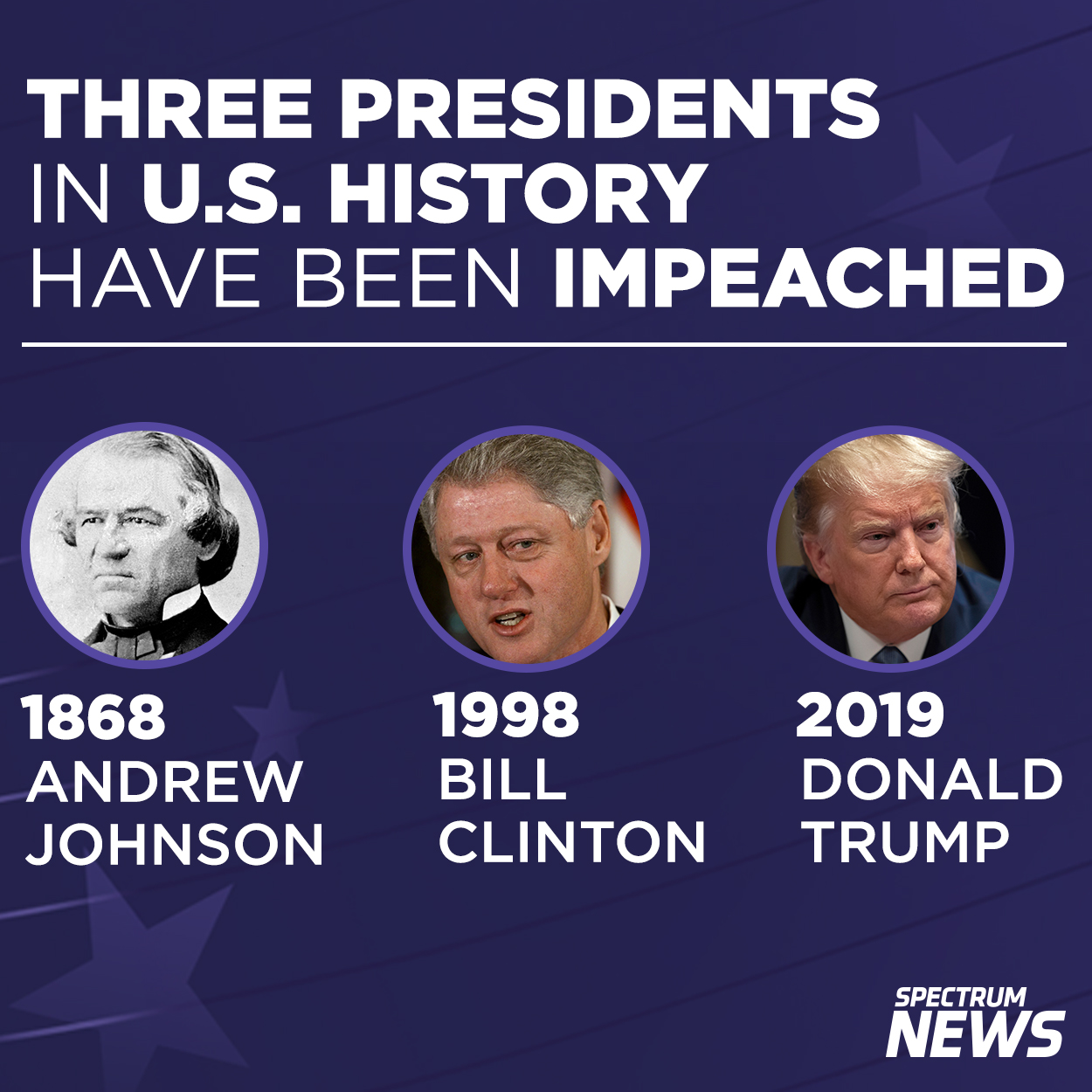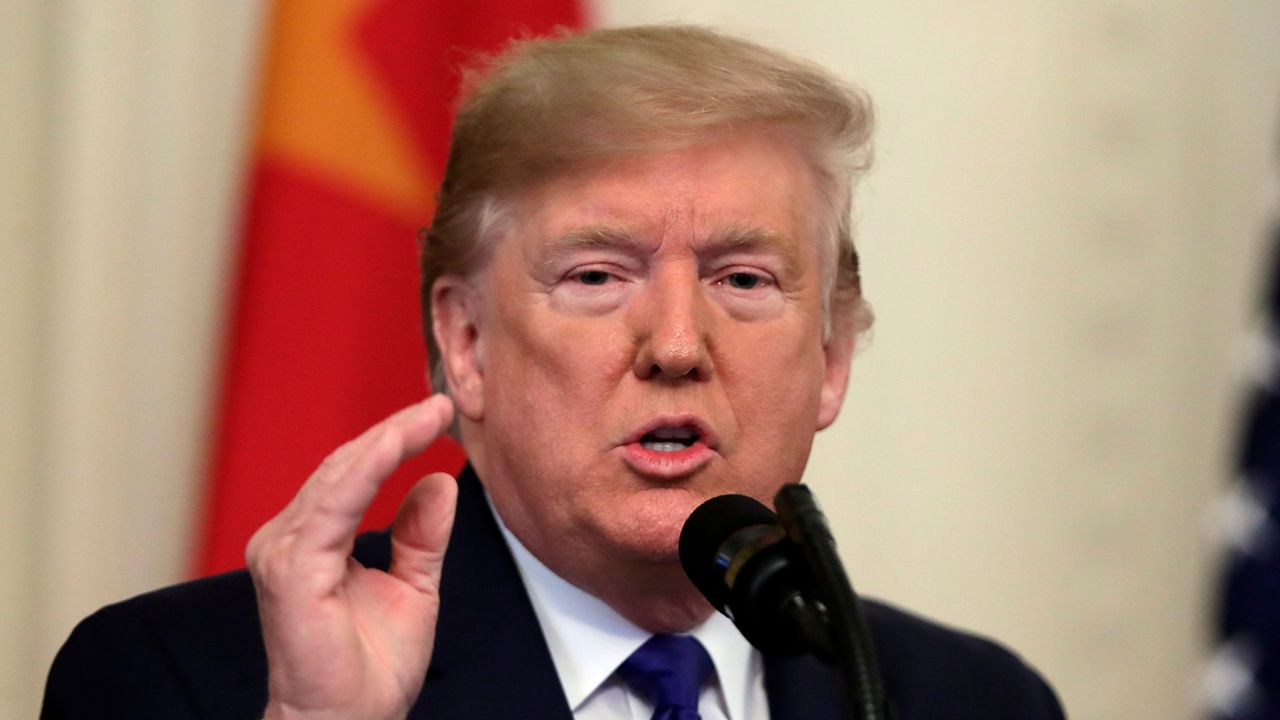For just the third time in American history, senators will begin an impeachment trial to determine if they will remove a president from office.
The impeachment trial of President Donald Trump is set to begin, after the U.S. House on Wednesday sent the approved articles of impeachment to the Senate.
What can we expect from the trial? Here are answers to some frequently asked questions:
When Will the Trial Start? How Long Will It Last?
The Senate transformed into an impeachment court Thursday, with the articles of impeachment formally presented and senators being sworn in as jurors for the trial, although significant proceedings will not begin until Tuesday after the Martin Luther King Jr. holiday.
Beyond that, it's unclear how long the trial will last. That will be determined by the Republican-controlled Senate and, specifically, Majority Leader Mitch McConnell. McConnell, who indicated he will coordinate with the White House, which wants a speedy trial, intends to introduce rules Tuesday for just that. On Monday, he proposed a condensed, two-day calendar for each side to give opening statements, ground rules that Democrats immediately rejected.
Voting on the Republican leader's resolution will be one of the first orders of business when senators convene Tuesday. It also pushes off any votes on witnesses until later in the process, rather than up front, as Democrats had demanded.
The first several days of the trial are now almost certain to be tangled in procedural motions playing out on the Senate floor or, more likely, behind closed doors, since senators must refrain from speaking during the trial proceedings.
After the four days of opening arguments — two days per side — senators will be allowed up to 16 hours for questions to the prosecution and defense, followed by four hours of debate. Only then will there be votes on calling other witnesses.
At the end of deliberations, the Senate would then vote on each impeachment article.
In theory, McConnell could establish a trial without witnesses in order to expedite a vote, but members of his own party have pressured the majority leader to bring witnesses, which would extend the trial to a degree.
Senate Republicans signaled they would reject the idea of simply voting to dismiss the articles of impeachment against Trump, as Trump himself has suggested. McConnell agreed he does not have the votes to do that.
Trump opposes the calling of additional witnesses, and the officials said they expect the trial to conclude before Trump delivers his State of the Union address February 4, but the timeline is still up for debate.
President Bill Clinton's impeachment trial in early 1999 lasted a little over a month, while Andrew Johnson's trial in 1868 lasted just over two months.

So Will There Be Any Witnesses?
That is still unclear. Republican senators are not completely united in the desire for a speedy trial, with some centrists siding with Democrats on the need to hear full testimony.
A mounting number of senators say they want to ensure the ground rules include the possibility of calling new witnesses.
Sen. Susan Collins of Maine is leading an effort among some Republicans, including Mitt Romney of Utah and Lisa Murkowski of Alaska, for votes on witnesses.
Romney said he wants to hear from John Bolton, the former national security adviser at the White House, who others have said raised alarms about the alternative foreign policy toward Ukraine being run by former New York City Mayor Rudy Giuliani, who is Trump's personal attorney.
Democrats have been pushing Republicans to consider new testimony, arguing that fresh information has emerged during Pelosi's month-long delay in transmitting the charges.
Ahead of Wednesday's session, Schiff released new records from Lev Parnas, an associate of Giuliani, about the Ukraine strategy, including an exchange with another man about surveilling Ambassador Maria Yovanovitch, who was later fired.
Republicans control the chamber, 53-47, and are all but certain to acquit Trump. But it takes just 51 votes during the trial to approve rules or call witnesses. Just four GOP senators could form a majority with Democrats to insist on new testimony. It also would take only 51 senators to vote to dismiss the charges against Trump.
At Tuesday's private GOP lunch, Sen. Rand Paul of Kentucky warned that if witnesses are allowed, defense witnesses could also be called. He and other Republicans want to subpoena Biden and his son, Hunter, who served on the board of a gas company in Ukraine, Burisma, while his father was vice president.
McConnell prefers to model Trump's trial partly on the process used for Clinton's impeachment trial. It, too, contained motions for dismissal or calling new witnesses.
Sen. Charles Schumer of New York, the Democratic leader, last month proposed a trial that would feature four witnesses, including acting White House chief of staff Mick Mulvaney and Bolton, but McConnell rejected the request.
McConnell is hesitant to call new witnesses who would prolong the trial and put vulnerable senators who are up for reelection in 2020 in a bind with tough choices. At the same time, he wants to give those same senators ample room to show voters they are listening.
McConnell and Schumer's predecessors as leaders, Republican Trent Lott of Mississippi and Democrat Tom Daschle of South Dakota, agreed on a basic outline before Clinton's trial began, deferring more difficult issues, including witnesses, until later.
Why Was Trump Impeached?
Last month, Trump was impeached by the Democratic-controlled House on two articles of impeachment: abuse of power by a 230-197 margin, and obstruction of Congress by a 229-198 margin. The House impeached Trump, alleging he abused his presidential power by pressuring Ukraine to investigate Democratic rival Joe Biden, using military aid Congress allocated for the country as leverage. Trump was also charged with obstructing Congress's ensuing probe by refusing to provide requested documents and ordering members of the Executive Branch to not comply with congressional subpoenas during the impeachment proceedings.
Trump's political campaign has dismissed it all as "just a failed attempt to politically damage President Trump leading up to his reelection," at times arguing requesting Ukraine to dig up dirt on Biden was justified.
How Many Votes Are Needed For Conviction?
An impeachment trial is different from a House vote in that the bar is higher. Instead of a simple majority that is required in the House, two-thirds of senators present (67 out of 100 if all senators attend) are needed to convict and remove the president from office.
What Will the Trial Look Like?
Seven impeachment managers — the members of Congress who will prosecute the case — were named Wednesday: the chairmen of the House impeachment proceedings, Reps. Adam Schiff of the Intelligence Committee and Jerry Nadler of the Judiciary Committee, as well as Hakeem Jeffries of New York, Sylvia Garcia of Texas, Val Demings of Florida, Jason Crow of Colorado, and Zoe Lofgren of California.
Two are freshmen lawmakers — Crow is a former Army Ranger who served in Iraq and Afghanistan, and Garcia is a former judge in Houston. Demings is the former police chief of Orlando, and Jeffries is a lawyer and chairman of the House Democratic Caucus.
In some respects, a Senate impeachment trial resembles a typical courtroom proceeding, with a judge — Chief Justice of the United States John Roberts, in this case — presiding and a jury, albeit a 100-member one. But there are important differences.
For one, while senators determine the outcome, they also set the rules for the trial, may ask questions, and can be witnesses.
While courtroom jurors are screened for possible biases, voters already have selected the jury in elections that gave Republicans a Senate majority, with 53 seats. The GOP could insist on rules benefiting Trump, including limiting witnesses, though it would take just three Republicans to foil a party-line effort.
Even if all Democrats vote to convict Trump, the Democratic House managers still need to win over more than one-third of Republican senators for a conviction — a formidable task. By comparison, in the Clinton trial, Republican managers couldn't win over a single Democrat and several Republicans voted to acquit.
To make their case, the managers are likely to give opening and closing arguments that could last for several days and respond to senators' questions that also could be time-consuming. They also might question any witnesses. Trump's defense team would have equal time to rebut the charges. Each step, as well as the time it takes to reach agreement on the rules, takes days, if not weeks.
The president himself could take part, although that would be unprecedented. Senate rules call on the person impeached, or a representative, to answer the charges. The Clinton legal team that handled those tasks in 1999 included his top White House lawyers, but also Dale Bumpers, a former Democratic senator from Arkansas who was at ease in the chamber in which he served for nearly a quarter-century. White House Counsel Pat Cipollone appears to be coordinating Trump's defense.
Republicans might want to bring the trial to a quick end, but several GOP senators from swing states are committed to a full, fair trial and may want to avoid any appearance of partisanship or taking sides on behalf of Trump.
In Clinton's trial, Lott and Daschle allowed Democratic Sen. Robert Byrd of West Virginia to move for dismissal a couple of weeks after the proceedings began, but his motion failed basically along party lines.
The chief justice could also decide questions of evidence and procedure that are not spelled out in Senate rules. That means he could, in theory, allow the House Democrats serving as prosecutors to call the witnesses they want. Some lawyers suggest this could allow Democrats to bypass White House impediments to getting testimony from high-level administration officials.
But unlike in a courtroom where the judge's ruling is final, the Senate can override Roberts's decisions by a majority vote. The chief justice also might avoid injecting himself into the proceedings by using the escape clause he is given in the standing rules: Roberts can "submit any such question to a vote of the Members of the Senate."
Has a President Ever Been Removed From Office This Way?
No, but Johnson came extremely close. In his trial, the Senate voted 35 to 19 to convict the president on all three articles of impeachment he faced, just one vote shy of the magic number to give him the boot.
By comparison, Clinton's trial was far less dramatic. He was acquitted on both articles of impeachment he faced. The perjury charge failed 55-45 while the obstruction of justice charge resulted in a 50-50 split. Republicans could not convince any Democratic senators to convict him, and they lost five Republican votes on one impeachment article and 10 on the other.
Richard Nixon ended up leaving office, but that's because he resigned the presidency during his impeachment proceedings when it became clear he had lost support from most of his political allies.
What Happens If Trump Is Convicted?
If the president is convicted, the country would enter an unprecedented situation. Trump would be automatically removed from office, and Vice President Mike Pence would become president. It's not clear how quickly the succession would happen, but the Constitution does not contemplate any gap between a Senate vote to convict and the new president assuming power. "In the case of the removal of the President from office or of his death or resignation, the Vice President shall become President," the 25th Amendment says.
------
Looking for an easy way to learn about the issues affecting New York City?
Listen to our "Off Topic/On Politics" podcast: Apple Podcasts | Google Play | Spotify | iHeartRadio | Stitcher | RSS



